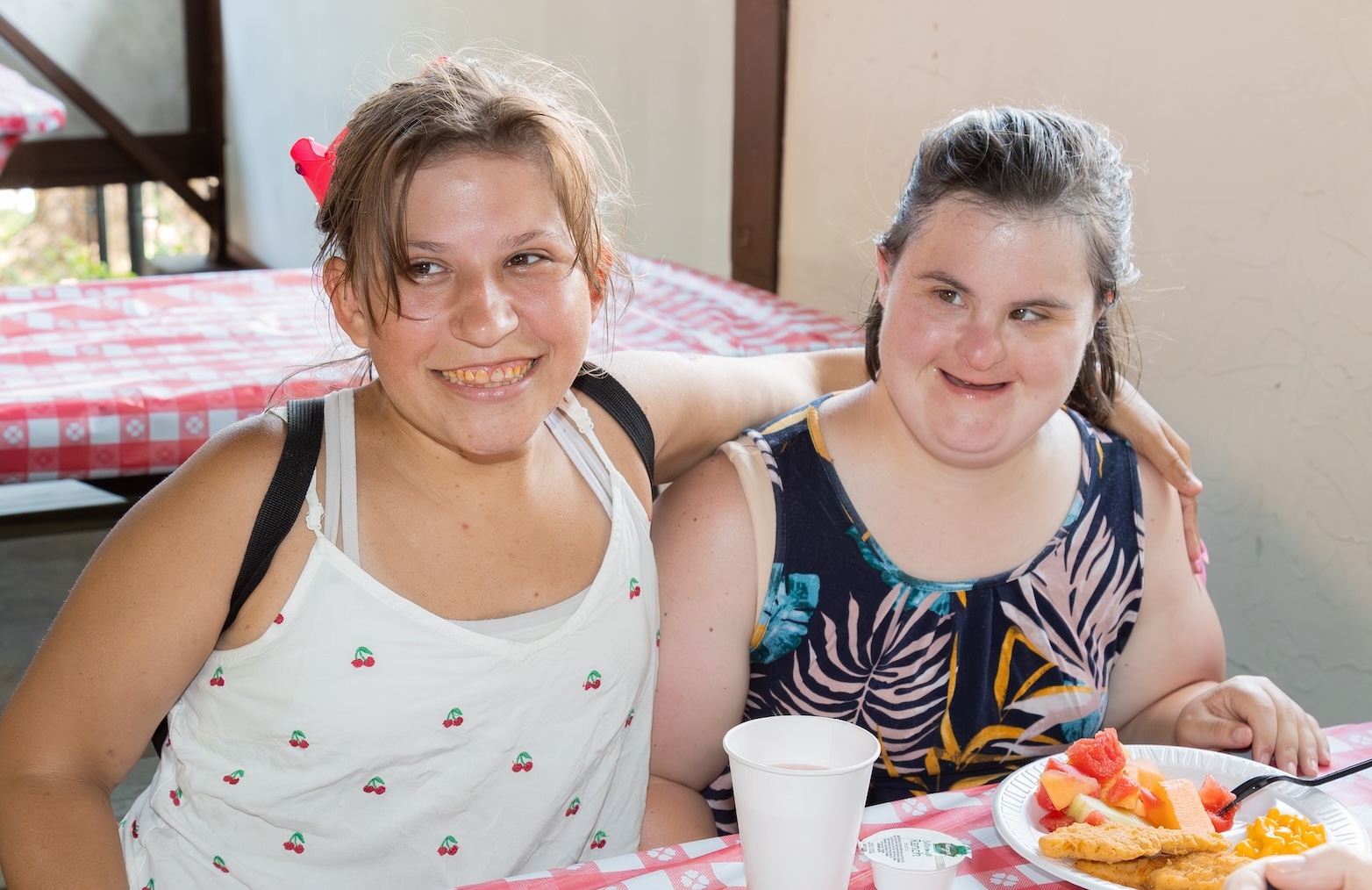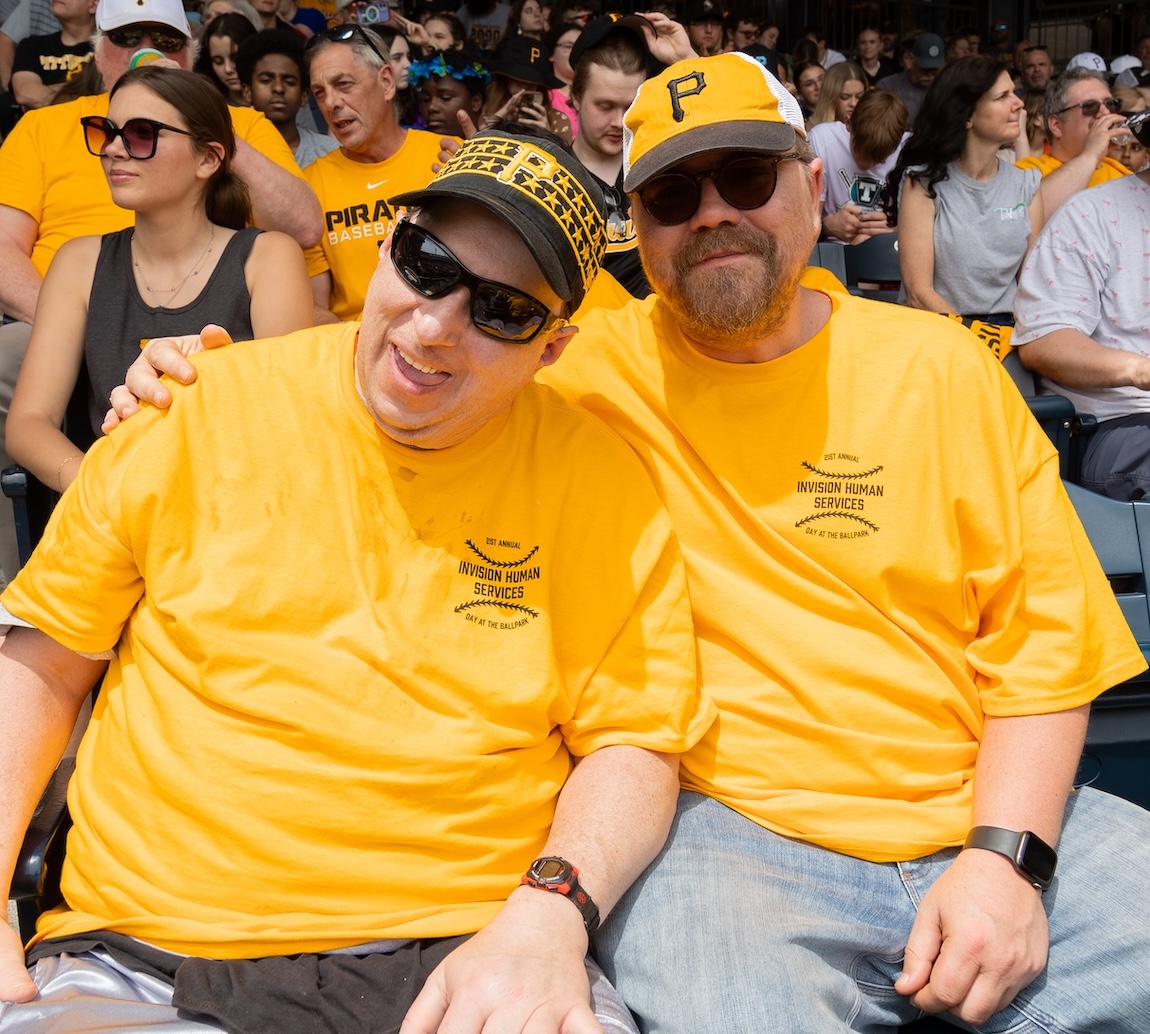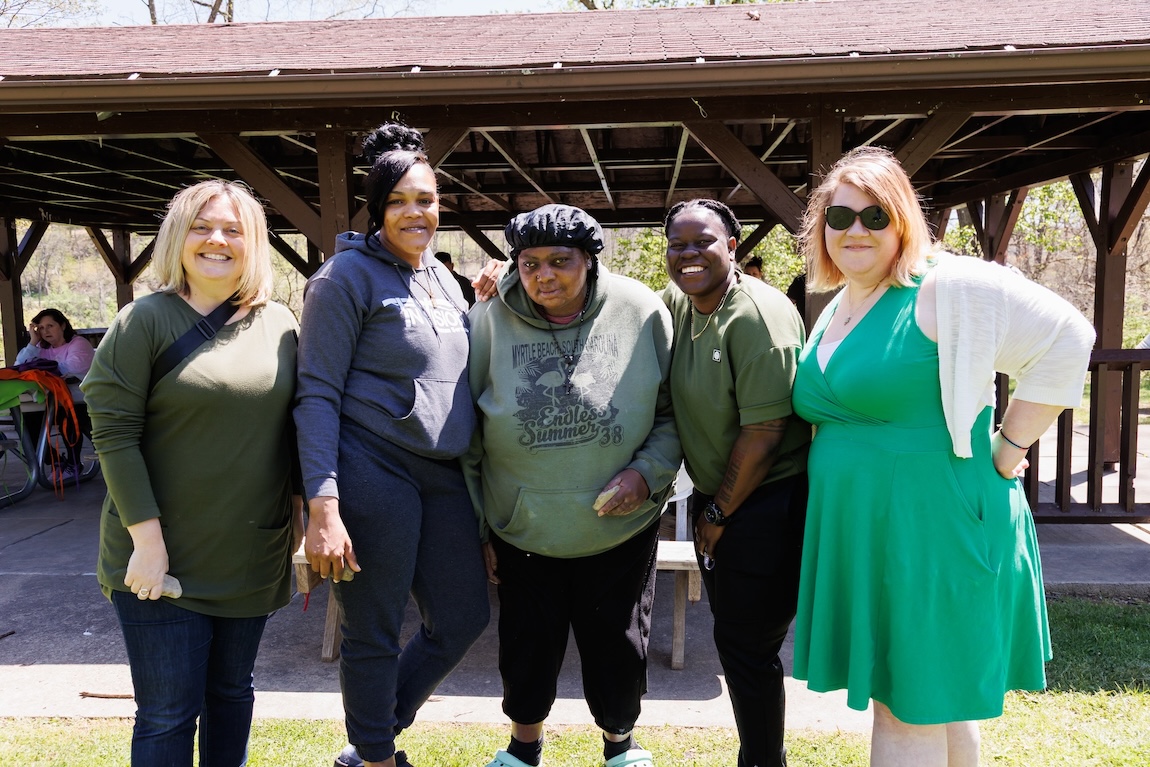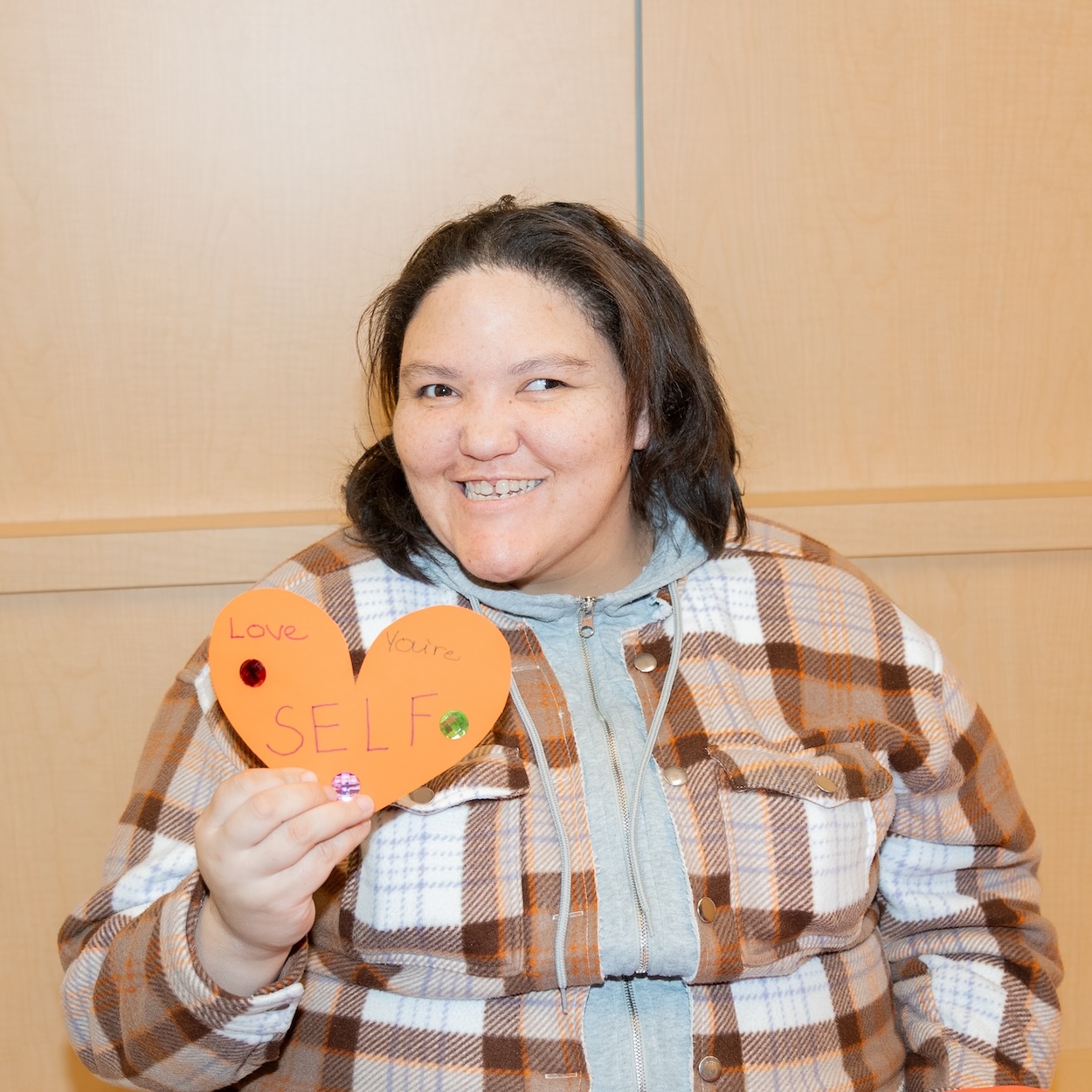The InVisionary
We are all familiar with self-advocacy, and standing up for our rights, personal needs, values, and beliefs. We also know that advocacy of any form – whether it be for ourselves, loved ones, strangers, organizations, or in response to political and social injustices – is not always easy. Although it can be intimidating, self-advocacy in particular is an essential skill that is learned and developed throughout our lives.
 Stemming from our mission of providing customized supports and services for people who experience disabilities in their pursuit of meaningful lives, InVision believes that the choices and life visions of all people – regardless of their differences – should be heard, valued, and honored.
Stemming from our mission of providing customized supports and services for people who experience disabilities in their pursuit of meaningful lives, InVision believes that the choices and life visions of all people – regardless of their differences – should be heard, valued, and honored.
For Randy Dicks, director of Community Based Programs at InVision, discussions of self-advocacy allow him to reminisce on a past story of a person supported that resonates with him to this day. During a discussion on the topic, Randy graciously recounted the story of Denny – a person who was supported by InVision’s Community Supports program for 17 years until his passing in 2017.
As an active member of member of Speaking for Ourselves – an organization dedicated to self-help and self-advocacy, run by and for people who experience disabilities across Pennsylvania – Denny traveled to Harrisburg every quarter to attend in-person meetings. His learnings from these meetings proved invaluable when faced with the hardship of losing his mom, whom he resided with until her passing. Upon being urged to join an organization outside of InVision for residential services, Denny was told he would no longer be able to receive community supports through InVision.
At Denny’s individual service plan (ISP) meeting, Randy and others from InVision showed up to advocate for Denny. Amid pushback and being told it was “someone else’s turn” to provide Denny with supports, it wasn’t the words of InVision that generated the desired outcome – it was those of Denny himself. Denny spoke up; firmly and strongly telling everyone that he was not a game. He couldn’t be passed around, and it was nobody’s turn. Denny emphasized that it was his life, and he had the right to pick the services he wanted.
“It was so powerful to see that because of his work with Speaking for Ourselves, when this was happening in his life, Denny knew how to fight,” Randy shared. “He also knew how to surround himself with the resources he needed to help win his battle.”
Stories such as Denny’s are a perfect reminder of the necessity of learning how to advocate for oneself. Here at InVision, we strive to cultivate opportunities for the people we support to develop these skills, and as such, InVision’s Self-Advocacy Group was created.
 Officially launched just over a year ago, the purpose of InVision’s Self-Advocacy Group is to provide the people we support at InVision with a safe environment to learn self-advocacy skills and access resources available to them. The group meets on a quarterly schedule, with in-person and virtual attendance open to all people supported by our organization. Meeting agendas and discussion topics are devised to offer people supported with opportunities to share their personal experiences, use their voices to speak up about what matters to them, and connect with others.
Officially launched just over a year ago, the purpose of InVision’s Self-Advocacy Group is to provide the people we support at InVision with a safe environment to learn self-advocacy skills and access resources available to them. The group meets on a quarterly schedule, with in-person and virtual attendance open to all people supported by our organization. Meeting agendas and discussion topics are devised to offer people supported with opportunities to share their personal experiences, use their voices to speak up about what matters to them, and connect with others.
While the development of this group was spearheaded by team members within our program operations – including Randy and Residential Operations Manager, Sarah Kahando – the goal for the group is to empower the people we support to take ownership of the group’s discussions. Voicing their interest and what they want to learn is at the center of shaping the future of the group and its success. Together, those we serve, and our team members will collaborate to arrange open forums, allowing for participation based on topic and interest.
As a part of licensing each year, the people we support review and sign a civil rights statement. The Self-Advocacy Group takes this a step further to give those we serve a better understanding of what their rights are, what they mean, and how they can advocate for themselves. Conversations among this group cover topics such as rights and consent, financial planning, employment supports, and more.
“We don’t want people to see this group as forms we fill out,” Randy said. “We want people to understand that this is about their rights, their lives, and what they want.”
 What draws the people we support to these group meetings includes curiosity, a willingness to learn new things and share personal stories, and the irreplaceable chance to meet and talk with others. In March 2025, the group discussed employment – sparking great questions concerning employment supports, volunteering, and even what it takes to start a small business.
What draws the people we support to these group meetings includes curiosity, a willingness to learn new things and share personal stories, and the irreplaceable chance to meet and talk with others. In March 2025, the group discussed employment – sparking great questions concerning employment supports, volunteering, and even what it takes to start a small business.
“Questions like these coming from the people we support are critical,” Sarah Kahando said. “It tells us where their thoughts are going and provides guidance on the topics and resources [we as team members] can start looking into. It has been incredible to see the people we support describe what they are leaning in their own words.”
The next meeting, discussing medical and health care information, will be held at 1:00 p.m. on Thursday, June 26.
“Often times, we see behavioral challenges occur when people feel like they don’t have power and control in their lives,” Randy added. “InVision’s Self-Advocacy Group can assist with giving the people we support that power and control back into their lives; naturally fostering stronger relationships between our DSPs and people supported.”
 Additionally, participation in self-advocacy among the people we support promotes InVision’s organizational growth. It also offers all team members – regardless of department or role – opportunities to participate, whether it be directly or in-directly. Collectively, we can encourage the people we support to get involved, share topics, and provide feedback for the betterment of the program.
Additionally, participation in self-advocacy among the people we support promotes InVision’s organizational growth. It also offers all team members – regardless of department or role – opportunities to participate, whether it be directly or in-directly. Collectively, we can encourage the people we support to get involved, share topics, and provide feedback for the betterment of the program.
“We are feeling the weight of the world out there, so you can image the feelings the people we support face,” Sarah concluded. “Sharing resources is a great way to give back and help ease the pressure of the world today. I am always humbled by the people we support, and if I can share even one thing that helps them, I am honored to do that. Knowledge is power, and we need to empower people with that!”
 To everyone at InVision, let’s challenge each other to spread the word, share resources, and encourage the people we support to take a stand and show up for themselves. Extending outside the office, we can work toward our organizational vision by practicing self-advocacy of our own; as well as advocating and sharing resources for others in need.
To everyone at InVision, let’s challenge each other to spread the word, share resources, and encourage the people we support to take a stand and show up for themselves. Extending outside the office, we can work toward our organizational vision by practicing self-advocacy of our own; as well as advocating and sharing resources for others in need.
InVision team members and people supported looking for more information regarding the Self-Advocacy Group, or meeting occurrences, topics, and RSVPS, please reach out to your direct program manager.
 Stemming from our mission of providing customized supports and services for people who experience disabilities in their pursuit of meaningful lives, InVision believes that the choices and life visions of all people – regardless of their differences – should be heard, valued, and honored.
Stemming from our mission of providing customized supports and services for people who experience disabilities in their pursuit of meaningful lives, InVision believes that the choices and life visions of all people – regardless of their differences – should be heard, valued, and honored. For Randy Dicks, director of Community Based Programs at InVision, discussions of self-advocacy allow him to reminisce on a past story of a person supported that resonates with him to this day. During a discussion on the topic, Randy graciously recounted the story of Denny – a person who was supported by InVision’s Community Supports program for 17 years until his passing in 2017.
As an active member of member of Speaking for Ourselves – an organization dedicated to self-help and self-advocacy, run by and for people who experience disabilities across Pennsylvania – Denny traveled to Harrisburg every quarter to attend in-person meetings. His learnings from these meetings proved invaluable when faced with the hardship of losing his mom, whom he resided with until her passing. Upon being urged to join an organization outside of InVision for residential services, Denny was told he would no longer be able to receive community supports through InVision.
At Denny’s individual service plan (ISP) meeting, Randy and others from InVision showed up to advocate for Denny. Amid pushback and being told it was “someone else’s turn” to provide Denny with supports, it wasn’t the words of InVision that generated the desired outcome – it was those of Denny himself. Denny spoke up; firmly and strongly telling everyone that he was not a game. He couldn’t be passed around, and it was nobody’s turn. Denny emphasized that it was his life, and he had the right to pick the services he wanted.
“It was so powerful to see that because of his work with Speaking for Ourselves, when this was happening in his life, Denny knew how to fight,” Randy shared. “He also knew how to surround himself with the resources he needed to help win his battle.”
Stories such as Denny’s are a perfect reminder of the necessity of learning how to advocate for oneself. Here at InVision, we strive to cultivate opportunities for the people we support to develop these skills, and as such, InVision’s Self-Advocacy Group was created.
What is InVision’s Self-Advocacy Group?
 Officially launched just over a year ago, the purpose of InVision’s Self-Advocacy Group is to provide the people we support at InVision with a safe environment to learn self-advocacy skills and access resources available to them. The group meets on a quarterly schedule, with in-person and virtual attendance open to all people supported by our organization. Meeting agendas and discussion topics are devised to offer people supported with opportunities to share their personal experiences, use their voices to speak up about what matters to them, and connect with others.
Officially launched just over a year ago, the purpose of InVision’s Self-Advocacy Group is to provide the people we support at InVision with a safe environment to learn self-advocacy skills and access resources available to them. The group meets on a quarterly schedule, with in-person and virtual attendance open to all people supported by our organization. Meeting agendas and discussion topics are devised to offer people supported with opportunities to share their personal experiences, use their voices to speak up about what matters to them, and connect with others. While the development of this group was spearheaded by team members within our program operations – including Randy and Residential Operations Manager, Sarah Kahando – the goal for the group is to empower the people we support to take ownership of the group’s discussions. Voicing their interest and what they want to learn is at the center of shaping the future of the group and its success. Together, those we serve, and our team members will collaborate to arrange open forums, allowing for participation based on topic and interest.
As a part of licensing each year, the people we support review and sign a civil rights statement. The Self-Advocacy Group takes this a step further to give those we serve a better understanding of what their rights are, what they mean, and how they can advocate for themselves. Conversations among this group cover topics such as rights and consent, financial planning, employment supports, and more.
“We don’t want people to see this group as forms we fill out,” Randy said. “We want people to understand that this is about their rights, their lives, and what they want.”
 What draws the people we support to these group meetings includes curiosity, a willingness to learn new things and share personal stories, and the irreplaceable chance to meet and talk with others. In March 2025, the group discussed employment – sparking great questions concerning employment supports, volunteering, and even what it takes to start a small business.
What draws the people we support to these group meetings includes curiosity, a willingness to learn new things and share personal stories, and the irreplaceable chance to meet and talk with others. In March 2025, the group discussed employment – sparking great questions concerning employment supports, volunteering, and even what it takes to start a small business. “Questions like these coming from the people we support are critical,” Sarah Kahando said. “It tells us where their thoughts are going and provides guidance on the topics and resources [we as team members] can start looking into. It has been incredible to see the people we support describe what they are leaning in their own words.”
The next meeting, discussing medical and health care information, will be held at 1:00 p.m. on Thursday, June 26.
How to Get Involved
InVision’s Self-Advocacy Group is still in its infancy stages, with room for growth and improvement. While the group’s primary focus is the people we support, it is also a great opening for direct support professionals (DSPs) to further their learning and involvement in advocating for the people they support. It is a boundless way for DSPs to empower people supported to explore resources and opportunities.“Often times, we see behavioral challenges occur when people feel like they don’t have power and control in their lives,” Randy added. “InVision’s Self-Advocacy Group can assist with giving the people we support that power and control back into their lives; naturally fostering stronger relationships between our DSPs and people supported.”
 Additionally, participation in self-advocacy among the people we support promotes InVision’s organizational growth. It also offers all team members – regardless of department or role – opportunities to participate, whether it be directly or in-directly. Collectively, we can encourage the people we support to get involved, share topics, and provide feedback for the betterment of the program.
Additionally, participation in self-advocacy among the people we support promotes InVision’s organizational growth. It also offers all team members – regardless of department or role – opportunities to participate, whether it be directly or in-directly. Collectively, we can encourage the people we support to get involved, share topics, and provide feedback for the betterment of the program.“We are feeling the weight of the world out there, so you can image the feelings the people we support face,” Sarah concluded. “Sharing resources is a great way to give back and help ease the pressure of the world today. I am always humbled by the people we support, and if I can share even one thing that helps them, I am honored to do that. Knowledge is power, and we need to empower people with that!”
 To everyone at InVision, let’s challenge each other to spread the word, share resources, and encourage the people we support to take a stand and show up for themselves. Extending outside the office, we can work toward our organizational vision by practicing self-advocacy of our own; as well as advocating and sharing resources for others in need.
To everyone at InVision, let’s challenge each other to spread the word, share resources, and encourage the people we support to take a stand and show up for themselves. Extending outside the office, we can work toward our organizational vision by practicing self-advocacy of our own; as well as advocating and sharing resources for others in need. InVision team members and people supported looking for more information regarding the Self-Advocacy Group, or meeting occurrences, topics, and RSVPS, please reach out to your direct program manager.

Comments (0)